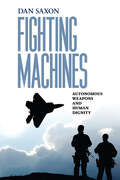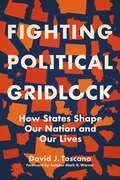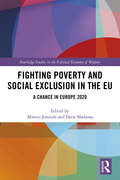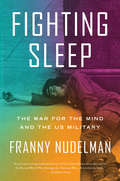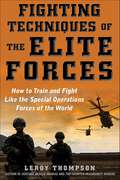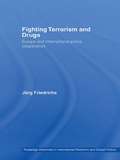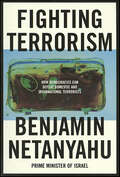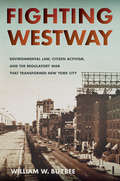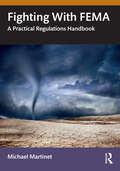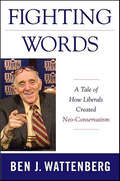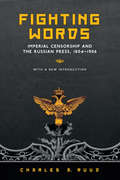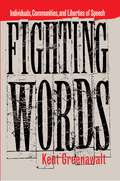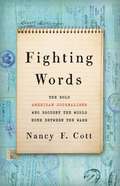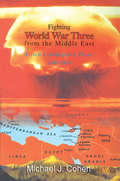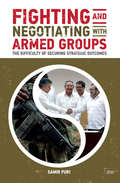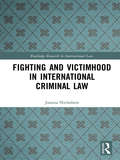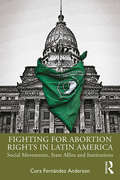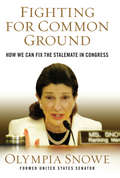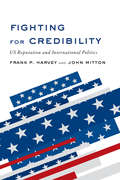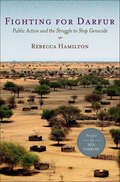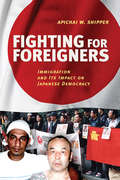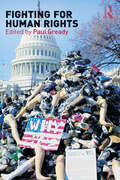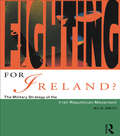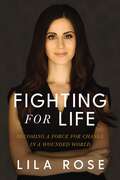- Table View
- List View
Fighting Machines: Autonomous Weapons and Human Dignity (Pennsylvania Studies in Human Rights)
by Dan SaxonLethal autonomous weapons are weapon systems that can select and destroy targets without intervention by a human operator. Fighting Machines explores the relationship between lethal autonomous weapons (LAWS), the concept of human dignity, and international law. Much of this analysis speaks to three fundamental and related problems: When a LAWS takes a human life, is that killing a violation of human dignity? Can states and non-state actors use LAWS in accordance with international law? And are there certain responsibilities of human decision-making during wartime that we should not delegate to machines?In the book, Dan Saxon argues that the use of LAWS to take human life constitutes a violation of human dignity. Rather than concentrating on the victims of the use of lethal force, Saxon instead focuses on the technology and relevant legal principles and rules to advance several propositions. First, as LAWS operate at increasingly greater speeds, their use will undermine the opportunities for, and the value of, human reasoning and judgment. Second, by transferring responsibility for reasoning and judgment about the use of lethal force to computer software, the use of LAWS violates the dignity of the soldiers, commanders, and law enforcement officers who historically have made such decisions, and, therefore, breaches international law. Third, weapon designs that facilitate teamwork between humans and autonomous systems are necessary to ensure that humans and LAWS can operate interdependently so that individuals can fulfil their obligations under international law—including the preservation of their own dignity—and ensure that human reasoning and judgment are available for cognitive functions better suited to humans than machines.Fighting Machines speaks to the fields of international humanitarian law, human rights, criminal law, and legal philosophy. It will also be of interest to non-lawyers, especially military officers, government policy makers, political scientists, and international relations scholars, as well as roboticists and ethicists.
Fighting Political Gridlock: How States Shape Our Nation and Our Lives
by David J. ToscanoIn this profoundly polarized era, the nation has been transfixed on the politics of Washington and its seemingly impenetrable gridlock. Many of the decisions that truly affect people’s lives, however, are being made not on the federal level but in the states. Faced with Washington’s political standoff, state governments are taking action on numerous vital issues, often impacting citizens and their communities far more than the decision makers in D.C. Despite this, few Americans really understand their state governments or the issues they address. In Fighting Political Gridlock, David Toscano reveals how the states are working around the impasse in Washington and how their work is increasingly shaping society.Long a central figure in one of the most important legislative bodies in the nation, the Virginia House of Delegates, Toscano brings a unique expertise to this urgent and timely discussion. Beginning with an analysis of state responses to COVID-19, including the processes and consequences of declaring states of emergency, he goes on to detail how various states are attacking issues in different ways–from education and voting to criminal justice and climate change–and provides a broad overview of how state actions affect our system of federalism. Toscano concludes with a call to action and civic engagement, including suggestions for how citizens and public officials can revitalize American democracy.
Fighting Poverty and Social Exclusion in the EU: A Chance in Europe 2020 (Routledge Studies in the Political Economy of the Welfare State)
by Matteo Jessoula Ilaria MadamaIn the field of anti-poverty policies, the interplay between the Europe 2020 overarching strategy and the 'Semester' have marked major discontinuity vis-à-vis the Open Method of Coordination for social protection and social inclusion (Social OMC) of the Lisbon phase. This book therefore asks whether and how Europe matters in the fight against poverty and social exclusion by assessing the emergence and possible institutionalisation of a European multi-level, multi-stakeholder and integrated policy arena in the new institutional framework. Supranational developments, multi-level interactions, as well as the strategy effects at the national level are analysed in six European countries - Belgium, Germany, Italy, Poland, UK and Sweden – with the aim to identify the key factors affecting the implementation of the Europe 2020 anti-poverty strategy. This book will be of key interest to students, scholars and practitioners in social policy, political science and European governance, and more broadly to European Union politics, European integrations studies, sociology and economics.
Fighting Sleep: The War for the Mind and the US Military
by Franny NudelmanHow the military used sleep as a weapon—and how soldiers fought backOn April 21, 1971, hundreds of Vietnam veterans fell asleep on the National Mall, wondering whether they would be arrested by daybreak. Veterans had fought the courts for the right to sleep in public while demonstrating against the war. When the Supreme Court denied their petition, they decided to break the law and turned sleep into a form of direct action. During and after the Second World War, military psychiatrists used sleep therapies to treat an epidemic of “combat fatigue.” Inducing deep and twilight sleep in clinical settings, they studied the effects of war violence on the mind and developed the techniques of brainwashing that would weaponize both memory and sleep. In the Vietnam War era, radical veterans reclaimed the authority to interpret their own traumatic symptoms—nightmares, flashbacks, insomnia—and pioneered new methods of protest. In Fighting Sleep, Franny Nudelman recounts the struggle over sleep in the postwar world, revealing that sleep was instrumental to the development of military science, professional psychiatry, and antiwar activism. Traversing the fields of military and mainstream psychiatry, popular and institutional film, documentary sound technology, brain warfare, and postwar social movements, she demonstrates that sleep—far from being passive, empty, or null—is a site of contention and a source of political agency.
Fighting Techniques of the Elite Forces: How to Train and Fight Like the Special Operations Forces of the World
by Leroy ThompsonLearn the trade secrets of special operatives. It is easy to visualize special operations troops as men in camouflage with painted faces, lurking in the shadows of modern warfare. But the truth is far more complex—and enthralling. A wide array of skills, both physical and cerebral, combines to make up the modern elite soldier. Fighting Techniques of the Elite Forces not only shows the road down which the specialist must travel to reach his place as one of the world's fighting elite, it details the equipment he uses to carry out his missions and the actual techniques he employs. Themed chapters and a wealth of illustrations explain everything you need to know about the formidably trained warriors of the British and Australian SAS, US Army Rangers, Navy SEALs, the French GIGN, and more. Learn how to select a drop zone for parachute insertions or how to execute a High Altitude High Opening (HAHO) insertion when you are twenty miles' distance from your objective. Find out how combat swimmers launch from submarines to carry out beach reconnaissance prior to an invasion. Understand the special considerations and knowledge required to fight and, more importantly, survive in such hostile environments as jungle, desert, or mountain. Discover how today's special operative must master skills as diverse as horsemanship and the compact computer, or how to kill silently with a knife or laser designator.Fighting Techniques of the Elite Forces is a must-have for anyone interested in the covert world of elite forces; it will provide the key to understanding what makes the specialist soldier so very "special."
Fighting Terrorism and Drugs: Europe and International Police Cooperation (Routledge Advances in International Relations and Global Politics)
by Jörg FriedrichsFighting Terrorism and Drugs is an examination of European states in their fight against terrorism and drugs, from the 1960s up to the present day. Jörg Friedrichs explores what makes large European states willing or unwilling to participate in international police cooperation against terrorism and drugs. The book examines forty-eight case studies, with particular regard to the policy preferences of the four largest and most politically important EU Member States: Britain, France, Germany, and Italy. The author argues that if a real understanding of international cooperation is to develop, it is important to understand what individual states want and why they want it. To explain state preferences, Friedrichs considers interests, institutions and ideas from domestic, national and international levels that can affect state preferences either positively or negatively. This theoretically coherent book looks at international police cooperation from a truly international perspective and will be of interest to students and scholars of international relations, terrorism, criminology, international law and European integration.
Fighting Terrorism: How Democracies Can Defeat Domestic and International Terrorists
by Benjamin NetanyahuIn this innovative and concise work, Israeli politician Benjamin Netanyahu offers a compelling approach to understanding and fighting the increase in domestic and international terrorism throughout the world. Citing diverse examples from around the globe, Netanyahu demonstrates that domestic terrorist groups are usually no match for an advanced technological society which can successfully roll back terror without any significant curtailment of civil liberties. But Netanyahu sees an even more potent threat from the new international terrorism which is increasingly the product of Islamic militants, who draw their inspiration and directives from Iran and its growing cadre of satellite states. The spread of fundamentalist Islamic terrorism, coupled with the possibility that Iran will acquire nuclear weapons, poses a more frightening threat from an adversary less rational and therefore less controllable than was Soviet Communism. How democracies can defend themselves against this new threat concludes this provocative book.
Fighting Westway: Environmental Law, Citizen Activism, and the Regulatory War That Transformed New York City
by William W. BuzbeeFrom 1971 to 1985, battles raged over Westway, a multibillion-dollar highway, development, and park project slated for placement in New York City. It would have projected far into the Hudson River, including massive new landfill extending several miles along Manhattan's Lower West Side. The most expensive highway project ever proposed, Westway also provoked one of the highest stakes legal battles of its day. In Fighting Westway, William W. Buzbee reveals how environmentalists, citizens, their lawyers, and a growing opposition coalition, despite enormous resource disparities, were able to defeat this project supported by presidents, senators, governors, and mayors, much of the business community, and most unions. Although Westway's defeat has been derided as lacking justification, Westway's critics raised substantial and ultimately decisive objections. They questioned claimed project benefits and advocated trading federal Westway dollars for mass transit improvements. They also exposed illegally disregarded environmental risks, especially to increasingly scarce East Coast young striped bass often found in extraordinarily high numbers right where Westway was to be built.Drawing on archival records and interviews, Buzbee goes beyond the veneer of government actions and court rulings to illuminate the stakes, political pressures, and strategic moves and countermoves that shaped the Westway war, a fight involving all levels and branches of government, scientific conflict, strategic citizen action, and hearings, trials, and appeals in federal court. This Westway history illuminates how high-stakes regulatory battles are fought, the strategies and power of America's environmental laws, ways urban priorities are contested, the clout of savvy citizen activists and effective lawyers, and how separation of powers and federalism frameworks structure legal and political conflict. Whether readers seek an exciting tale of environmental, political, and legal conflict, to learn what really happened during these battles that transformed New York City, or to understand how modern legal frameworks shape high stakes regulatory wars, Fighting Westway will provide a good read.
Fighting With FEMA: A Practical Regulations Handbook
by Michael MartinetIn this book, disaster finance and cost recovery expert Michael Martinet provides unparalleled coverage of the practical, real-world key principles necessary to successfully navigate the nuances of federal regulations surrounding FEMA’s Public Assistance program. Accessibly written, Martinet demystifies the many policies, procedures, and administrative processes a local government agency should adopt before a disaster to prepare themselves for a greater financial recovery after a disaster. The intent is to awaken local authorities to the realities of the process and assist them in preparing for a day which all hope they will never see.Designed for financial officers, purchasing officials, Public Works officials, Building & Safety officials, public construction project managers, and emergency management professionals at all levels of government, Fighting With FEMA will also earn a place in the libraries of consulting disaster recovery specialists and students interested in the financial aspects of disasters.
Fighting Words: A Tale of How Liberals Created Neo-Conservatism
by Ben J. WattenbergHow did a nice, liberal Jewish boy from the Bronx come to be called a conservative?Ben J. Wattenberg has been at the center of American ideas and events since 1966, when he became a speechwriter for and aide to President Lyndon B. Johnson. Recruited out of the blue, Wattenberg worked closely with press secretary Bill Moyers and immersed himself in the world of high-powered Democratic strategy making. Eventually he served as an adviser to two Democratic presidential candidates and in the 1970s helped write the Democratic National Platform. But something funny happened on the way to the Great Society: Key players in the Democratic Party moved to the far left. Wattenberg was not happy with this situation, so he helped establish the Coalition for a Democratic Majority (CDM) and became one of the most outspoken voices in the so-called neo-con movement.Neo-conservatism, with its signature cause of promoting liberty around the world, is a philosophy often misunderstood, and the phrase neo-con is used frequently as an insult by those who fail to understand the concept. Wattenberg traces the emergence of the movement from its earliest roots among Cold War thinkers such as Irving Kristol and Norman Podhoretz and from among the ashes of pre-radical liberalism of the early 1960s, to ideological giants Scoop Jackson and Pat Moynihan, to Jeanne Kirkpatrick and Ronald Reagan. The author also discusses the proliferation of neo-con "think tanks," such as the American Enterprise Institute, as well as the surprising appearance of a neo-conservative platform in George W. Bush's administration, in which a number of Wattenberg's protégés have played key roles. With his characteristic wit and on-target observations, the author recounts personal anecdotes featuring a rich cast of characters from Johnson to Reverend Jesse Jackson to Rudolph Giulani, as well as many others. Never lacking for opinions---he calls himself the "immoderator" of PBS's Think Tank with Ben Wattenberg---the author is here to set the record straight, and as the New York Times has said, "Wattenberg has the annoying habit of being right." Replete with stories never told before, Fighting Words is Wattenberg's firsthand account of the remarkable transformation of American politics over the last four decades.
Fighting Words: Imperial Censorship and the Russian Press, 1804–1906
by Charles A RuudCensorship took many forms in Imperial Russia. First published in 1982, Fighting Words focuses on the most common form: the governmental system that screened written works before or after publication to determine their acceptability. Charles A. Ruud shows that, despite this system, the nineteenth-century Russian Imperial government came to grant far more extensive legal publishing freedoms than most Westerners realize, adopting a more liberal attitude towards the press by permitting it a position recognized by law. Fighting Words also reveals, however, that the government fell far short of implementing these reforms, thus contributing to the growth of opposition to the Tsarist regime in the second half of the nineteenth century and the first few years of the twentieth. Now back in print with a new introduction by the author, Fighting Words is a classic work offering insight into the press, censorship, and the limits of printed expression in Imperial Russia.
Fighting Words: Individuals, Communities, and Liberties of Speech
by Kent GreenawaltShould "hate speech" be made a criminal offense, or does the First Amendment oblige Americans to permit the use of epithets directed against a person's race, religion, ethnic origin, gender, or sexual preference? Does a campus speech code enhance or degrade democratic values? When the American flag is burned in protest, what rights of free speech are involved? In a lucid and balanced analysis of contemporary court cases dealing with these problems, as well as those of obscenity and workplace harassment, acclaimed First Amendment scholar Kent Greenawalt now addresses a broad general audience of readers interested in the most current free speech issues.
Fighting Words: The Bold American Journalists Who Brought the World Home Between the Wars
by Nancy F. CottFrom a Harvard historian, this riveting portrait of four trailblazing American journalists highlights the power of the press in the interwar period. In the fragile peace following the Great War, a surprising number of restless young Americans abandoned their homes and set out impulsively to see the changing world. In Fighting Words, Nancy F. Cott follows four who pursued global news -- from contested Palestine to revolutionary China, from Stalin's Moscow to Hitler's Berlin. As foreign correspondents, they became players in international politics and shaped Americans' awareness of critical interwar crises, the spreading menace of European fascism, and the likelihood of a new war -- while living romantic and sexual lives as modern and as hazardous as their journalism. An indelible portrayal of a tumultuous era with resonance for our own, Fighting Words is essential reading on the power of the press and the growth of an American sense of international responsibility.
Fighting World War Three from the Middle East: Allied Contingency Plans, 1945-1954
by Michael J. CohenThis description of Allied contingency plans for military operations in the Middle East - in the event of conflict with the Soviet Union - argues that diplomatic events and crises in the Middle East in 1945-55 are understandable only in the context of assets sought by the Allies in that region.
Fighting and Negotiating with Armed Groups: The Difficulty of Securing Strategic Outcomes (Adelphi series)
by Samir PuriWhat constitutes an effective and realistic strategy for dealing with non-state armed groups? This question has bedevilled states the world over. From Colombia and FARC, Turkey and the PKK, the Taliban in Afghanistan and Pakistan, and the persistent insurgency in Iraq – the governments concerned struggle to either fight or negotiate their way to an end. Fighting armed groups is an uncertain business, and so is negotiating. Doing both alternately, concurrently or selectively, is highly demanding. This book develops a framework to help analysts and policymakers understand the challenges of using a combination of coercion and diplomacy in dealing with armed groups. It considers which complexities have proved most inhibiting, and which have been worked around. What are the obvious traps that states fall into? What appear to be the smarter moves? Thinking in terms or ‘military’ or ‘political’ solutions is unhelpful – to be genuinely strategic, a response must concern itself with managing the mix. Ten examples from around the world are worked through to examine this theme. The net is cast wide purposefully, so that the lessons for strategy can be made explicit, rather than lost amid a bloody contemporary history of wars involving armed groups.
Fighting and Victimhood in International Criminal Law (Routledge Research in International Law)
by Joanna NicholsonThe act of fighting or being a fighter has certain consequences in international law. The most obvious example can be found in international humanitarian law, where a distinction is drawn between fighters and civilians, with fighters being military objectives and civilians being protected from attack. Another example is from international human rights law, where it has been held that the particular characteristics of military life have to be taken into account when interpreting the human rights of members of state armed forces. This volume focuses on the field of international criminal law and asks the question: what relevance does fighting have to victimhood in international criminal law? Among the topics which are explored are: how have international criminal courts and tribunals untangled lawful casualties of war from victims of war crimes? How have they determined who is a member of an organised armed group and who is not? What crimes can those who fight be victims of during hostilities? When does it become relevant in international criminal law that an alleged victim of a crime was a person hors de combat rather than a civilian? Can war crimes be committed against members of non-opposing forces? Can persons hors de combat be victims of crimes against humanity and genocide? What special considerations surround peacekeepers and child soldiers as victims of international crimes? The author carries out an in-depth exploration of case law from international criminal courts and tribunals to assess how they have dealt with these questions. She concludes that the import of fighting upon victimhood in the context of international criminal law has not always been appreciated to the extent it should have been.
Fighting for Abortion Rights in Latin America: Social Movements, State Allies and Institutions
by Cora Fernández AndersonAlthough they share similar socio-economic and cultural characteristics as well as their recent political histories, Argentina, Chile and Uruguay differ radically in their abortion policies. In this book, Cora Fernández Anderson examines the role social movements play in abortion reform to show how different interaction patterns with state actors have led to three different policy outcomes: comprehensive abortion reform in Uruguay; moderate abortion reform in Chile; and no legal abortion reform in Argentina. Synthesizing a broad range of literature and drawing on in-depth field and archival research, she analyzes the strength of the campaigns for abortion reform, their relationships with leftist parties in power and the context of Church–state relations to explain this diverging trajectory in policy reform. A masterly analysis of how social movements, the power of institutions and Executive preferences have strong explanatory power, Fighting for Abortion Rights in Latin America is a perfect supplement for classes on gender and global politics.
Fighting for Common Ground: How We Can Fix the Stalemate in Congress
by Olympia SnoweAn outspoken centrist, Senator Snowe stunned Washington in February 2012 when she announced she would not seek a fourth term and offered a sharp rebuke to the Senate, citing the dispiriting gridlock and polarization. After serving in the legislative branch at the state and federal levels for 40 years, including 18 years in the U. S. Senate, she explained that Washington wasn't solving the big problems anymore. In this timely call to action, she explores the roots of her belief in principled policy-making and bipartisan compromise. A leading moderate with a reputation for crossing the aisle, Senator Snowe will propose solutions for bridging the partisan divide in Washington, most notably through a citizens' movement to hold elected officials accountable. Senator Snowe recounts how the tragedies and triumphs of her personal story helped shape her political approach. Born in Augusta, Maine, Senator Snowe was orphaned at nine, and raised by an aunt and uncle. When she was twenty-six, her husband, a Maine state representative, was killed in an auto accident. Already dedicated to public service, she ran for and won her husband's seat. The book will include anecdotes from throughout her career, and address her working relationships with Presidents Reagan through Obama, Senator Ted Kennedy, Majority Leader Bob Dole, and many others. As a senior member of the powerful Senate Finance Committee, the high-profile Commerce and Intelligence Committees, and the Senate Small Business Committee, Senator Snowe has been directly involved with the most talked-about legislative challenges of recent decades: the country's response to 9/11; the 2008 financial crisis; the Affordable Healthcare Act; the debt ceiling debacle, and much more. Her new book will draw on the lessons she's learned as a policymaker, and the frustration she shares with the American people about the government's dwindling productivity. Senator Snowe passionately argues that the government has now lost its way, shows how this happened, and proposes ways for the world's greatest deliberative body to, once again, fulfill its mission.
Fighting for Credibility: US Reputation and International Politics
by Frank P. Harvey John MittonWhen Bashar al-Assad used chemical weapons against his own people in Syria, he clearly crossed President Barack Obama’s "red line." At the time, many argued that the president had to bomb in order to protect America's reputation for toughness, and therefore its credibility, abroad; others countered that concerns regarding reputation were overblown, and that reputations are irrelevant for coercive diplomacy. Whether international reputations matter is the question at the heart of Fighting for Credibility. For skeptics, past actions and reputations have no bearing on an adversary’s assessment of credibility; power and interests alone determine whether a threat is believed. Using a nuanced and sophisticated theory of rational deterrence, Frank P. Harvey and John Mitton argue the opposite: ignoring reputations sidesteps important factors about how adversaries perceive threats. Focusing on cases of asymmetric US encounters with smaller powers since the end of the Cold War including Bosnia, Kosovo, Iraq, and Syria, Harvey and Mitton reveal that reputations matter for credibility in international politics. This dynamic and deeply documented study successfully brings reputation back to the table of foreign diplomacy.
Fighting for Darfur: Public Action and the Struggle to Stop Genocide
by Rebecca HamiltonAround the world, millions of people have added their voices to protest marches and demonstrations because they believe that, together, they can make a difference. When we failed to stop the genocide in Rwanda in 1994, we promised to never let such a thing happen again. But nine years later, as news began to trickle out of killings in western Sudan, an area known as Darfur, the international community again faced the problem of how the United Nations and the United States government could respond to mass atrocity.Rebecca Hamilton passionately narrates the six-year grassroots campaign to draw global attention to the plight of Darfur's people. From college students who galvanized entire university campuses in the belief that their outcry could save millions of Darfuris still at risk, to celebrities such as Mia Farrow, who spurred politicians to act, to Steven Spielberg, who boycotted the 2008 Summer Olympics in Beijing, Hamilton details how advocacy for Darfur was an exuberant, multibillion-dollar effort. She then does what no one has done to date: she takes us into the corridors of power and the camps of Darfur, and reveals the impact of ordinary people's fierce determination to uphold the mantra of "never again." Fighting for Darfur weaves a gripping story that both dramatizes our moral dilemma and shows the promise and perils of citizen engagement in a new era of global compassion.
Fighting for Foreigners: Immigration and Its Impact on Japanese Democracy
by Apichai W. ShipperAlthough stereotypically homogenized and hostile to immigrants, Japan has experienced an influx of foreigners from Asia and Latin America in recent decades. In Fighting for Foreigners, Apichai W. Shipper details how, in response, Japanese citizens have established a variety of local advocacy groups-some faith based, some secular-to help immigrants secure access to social services, economic equity, and political rights.Drawing on his years of ethnographic fieldwork and a pragmatic account of political motivation he calls associative activism, Shipper asserts that institutions that support illegal foreigners make the most dramatic contributions to democratic multiculturalism. The changing demographics of Japan have been stimulating public discussions, the political participation of marginalized groups, and calls for fair treatment of immigrants. Nongovernmental organizations established by the Japanese have been more effective than the ethnically particular associations formed by migrants themselves, Shipper finds. Activists who initially work in concert to solve specific and local problems eventually become more ambitious in terms of political representation and opinion formation.As debates about the costs and benefits of immigration rage across the developed world, Shipper's research offers a refreshing new perspective: rather than undermining democracy in industrialized society, immigrants can make a positive institutional contribution to vibrant forms of democratic multiculturalism.
Fighting for Human Rights
by Paul GreadyIn a world that is increasingly disillusioned with formal politics, people are no longer prepared to wait for governments and international institutions to act on human rights concerns. This book identifies activism as a key means of realizing human rights and as a new form of politics. Fighting for Human Rights documents and compares successful high profile campaigns to cancel debt in the developing world, ban landmines and set up the International Criminal Court as well as emerging campaigns that focus on HIV/AIDS, environmental justice, democratization and blood diamonds.
Fighting for Ireland?: The Military Strategy of the Irish Republican Movement
by M.L.R. SmithFighting for Ireland? is the first in-depth account of the evolution of Irish Republican strategy. It is highly topical in the light of the faltering peace process and the growing speculation over the IRA's next move: further violence or a new non-violent strategy? This new, updated paperback edition is essential reading for those who wish to disentangle the complex issues and motives behind IRA violence.M.L.R. Smith challenges many assumptions about the IRA, pinpointing the organisation's successes as well as its missed opportunities. He demonstrates the tension the movement has experienced between ideology and strategic reality regarding the use of force, illustrating how doctrinal purity has sometimes hampered the IRA in the pursuit of its goals. Contrary to the Irish Republican movement's vigorous and assertive public face Smith uncovers an organisation characterised more by a sense of chronic insecurity than by certainty and continuity.
Fighting for Life: Becoming a Force for Change in a Wounded World
by Lila RoseWhat makes your heart break for our broken world? You want to make a difference in the world. You&’re concerned about all the problems you see, the injustices and the suffering. But you don&’t know where to begin. Designed for the aspiring activist or world-changer, this book is the key to get you started.Live Action founder Lila Rose says transformation begins with heartbreak—with seeing the injustices around you and allowing that suffering to light a fire in your soul. In this book, she shares raw and intimate stories from both her personal journey and pro-life activism that will inspire you to become a champion for your own cause. Along the way, you&’ll discover how todetermine where the need for your gifts is the greatest and begin making a difference;overcome insecurities and imposter syndrome and become a leader through practice;find inner courage and confidence in the face of obstacles and criticism; andbounce back from mistakes to continually grow and make a long-lasting impact.The fight for a world that is more just, more beautiful, and more loving needs all of us. In allowing yourself to be wounded by the brokenness of our world, you&’ll find the passion you need to make a difference—and draw closer to the One who truly saves.
Fighting for Love in the Century of Extinction: How Passion and Politics Can Stop Global Warming
by Eban GoodsteinThe central idea in Fighting for Love in the Century of Extinction is simple: Unchecked, global warming threatens to destroy one of every two animals, birds, plants, reptiles, forests, fish and other creatures alive today on the earth. This looming ecological collapse will only be arrested if we can articulate and embrace what the natural world means to each of us, and then fight a series of hard political battles to preserve creation. On a subject about which it is easy to feel despair, Goodstein offers a realistic, ambitious, and hopeful political solution to avoid a century of mass extinction, a vision grounded in a moral view that embraces the interconnection of all life forms on the planet. Emerging from his work as both an economist and a leader in the clean energy movement, this passionate book sets a new frame for helping Americans understand global warming as the challenge of our generation. Weaving personal narrative with scientific facts, Goodstein begins with an overview of the current global warming crisis. In Chapters 2 and 3 ("Wealth" and "Knowledge") he explores the question of whether the scale of mass extinction we are beginning to witness in the 21st century has more ominous implications for human welfare than it did in the 20th century. By destroying so much of creation,will we destroy the foundation of our own material prosperity? By tearing out so many pages in the book of life, are we depriving future generations of a vast store of knowledge? In "Spirit," he stresses the need to re-spiritualize the way we talk about the natural world. Without an effective moral language that reflects our deeply felt love of nature and its diversity, effective political action is impossible. "Politics" argues that if we are to hold global heating to the manageable, low end, Americans must stabilize emissions of global warming pollutants and begin to invest tens of billions of dollars every year in clean-energy technology solutions for the future. Stabilizing the climate requires strong leadership from the federal government --we must elect clean-energy leaders into the Senate, the House, and the Oval Office in the next few years. How to do this, by becoming involved in electoral politics, is the subject of the final chapter, "Solutions."
